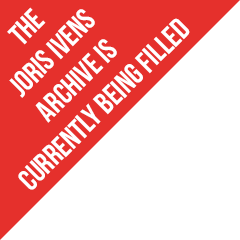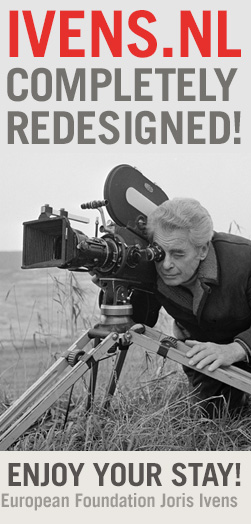

Curator: Wytze Koppelman (European platform film students 'Breaking Ground')
Name director: János Richter
Name film: Guañape Sur
Year of production: 2010
Shooting format: HD Cam
Documentary / Italy / 23 Minutes
This film was only available to warch in March 2015 thanks to János Richter and Andana Films. Contact them to see the film. Here you can watch the trailer of the film. We asked Wytze Koppelman, coordinator of the European platform for film students 'Breaking Ground' to be curator this month. He selected the film 'Guañape Sur of János Richter. Wytze sees a lot of films from a new genaration filmmakers all over Europe, so it is interesting to ask him about what strikes him at the moment, especially in the light of 'Politics and Poetry'.
About you (the curator)
Name: Wytze Koppelman
Function: Head of programme
Country: The Netherlands
What is the aim of Breaking Ground: We are a platform for European student films, so we show new and emerging film talent from around Europe at our events. Our goal with this is of course to give these new talents more exposure and introduce them to audiences while they’re still in film school or just got out. We want to give these makers a head start in their career and we want audiences to take note of them, and see some fine films, of course.
As a coordinator of Breaking Ground, you see a lot of student films. Do you notice any trends and do you see a lot of political films ? And how do these new filmmakers relate to the topic of 'politics and poetry'? (was it hard to select a film for our page for example?) It kind of depends on how you define a political film. In essence pretty much any film is political, because it’s related to so many things, values and streams of thought, when you send it out into the world. Those relations are there, whether a filmmaker wants it or not. But then again, there are subjects that people generally find more political than others.
When it comes to student films, those subjects are mostly found in documentaries. Human rights violations, crises on a bigger scale than just the individual, or the individual representing a larger problem that’s a hot topic. I wouldn’t go as far as to say that there are any particular trends in student film, though a lot of schools teach in a way that brings about a certain style which is often used at that particular school.
An absence of trends makes for a lot of diversity. In that sense the topic of politics and poetry is also something that’s handled very diversely in student film. Maybe to relate it more to the topic at hand, is to say that the brand of politics & poetry which Ivens himself used, is something that’s quite rare in student film. Though the film I’ve selected does more or less fit in that brand of documentary filmmaking and so it wasn’t hard to select.
About the film and the filmmaker:
What can you tell about this film? Guañape Sur takes us to an island off the coast of Peru, where a group of workers harvest the guano, left there by the birds. The harvesting only happens once every ten years and it’s quite the job.
How does this film relate to the theme ‘politics and poetry’ in your opinion? Visually the film is very strong, with beautiful shots and a strong, determined rhythm in which those shots are shown. With this, the poetry is quite easily visible. The political comes into place with the filming of a group of men, working together to do a job and make a living. The film focuses on these men doing their job, not on individual experience. A strong sense of mood, place and action are at work here. Those qualities combined with a more abstract focus on a group instead of the individual are thing that remind me most of Ivens’ films. Politics and poetry are definitely at work here.
Are politics and poetry (or politics and arts) two separate worlds according to you? Why / why not? They’re interrelated. Life imitates art, art imitates life. The political governs and structures the place in which we live. Of course they’re separated as sectors or industries in which we work, but that’s just a mode of working in which the world is divided. Politics is everywhere, where there are people. Art is made everywhere, where there are people.
Breaking Ground is a European platform, and there are a lot of political tensions and changes the last years which affects Europe directy. Do you (already) notice any changes in the focus and/or ideas of new filmstudents because of these developments? Well, yes and no. In subject matter, you can see a direct response to our current state in Europe. Again that’s mostly visible in the documentary department. But this is just a small part of the films we see. Mostly the subject matter is still very diverse. Not everyone is interested in making a film about current affairs issues. And on the other hand, a lot of student filmmakers don’t have the means to travel to a hotbed of action and make a documentary. Using these subject matters in fiction also happens, but it’s a rarity.
You compare the filmstyle of János Richter and Ivens. Can you explain the comparisons? As I’ve said earlier, what comes to mind when I think of the films of Joris Ivens, is a strong sense of place and mood. A lot of the times a group is being filmed with the focus being on the group instead of one or two individuals. This might best be compared to a lot of documentaries being made at film schools these days, which most of the time follow one or two persons. I feel that a focus on the individual in documentary form is something that has become more strongly apparent over the course of the history of the format. Might have something to do with social changes, might not. But what I take away from Ivens is filming the action of a group. Their handling of situations, the actions they take and not so much the group dynamics (i.e. the relations of the individuals to each other). That’s something which also speaks very strongly in Guañape Sur. Therefore I find it a fitting choice to shed some light on the political and the poetic.
